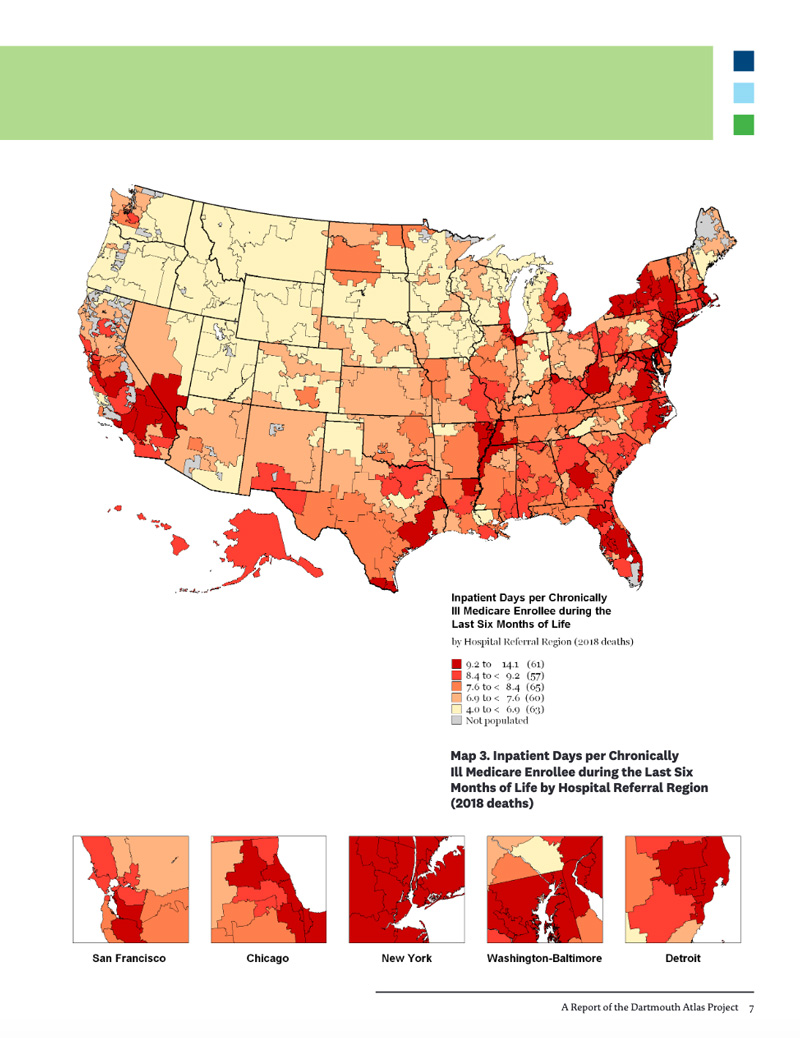The Dartmouth Institute for Health Policy and Clinical Practice is pleased to announce that its Dartmouth Atlas of Health Care series is fully available on the National Library of Medicine’s NCBI (National Center for Biotechnology Information) Bookshelf. The entire Dartmouth Atlas collection can be found here.
“All 67 of our reports, which vary in length from about two pages to over 300 pages are now available in browser, PubReader, and PDF formats for download—with no fees or registration required,” says Kristen Bronner, MA, who serves as the Atlas editor.
The Bookshelf also makes machine-readable cataloging records available to libraries. “This should make it easier for them to organize and list Dartmouth Atlas reports,” says Bronner. In addition, Atlas reports now have PubMed records and appear in searches.
 Reaching this new level of scope and accessibility marks a notable milestone in the evolution of the Dartmouth Atlas Project. Led by Dr. Jack Wennberg, who founded The Dartmouth Institute as the Center for Evaluative Clinical Sciences at Dartmouth in 1988, the Atlas was first published in 1996.
Reaching this new level of scope and accessibility marks a notable milestone in the evolution of the Dartmouth Atlas Project. Led by Dr. Jack Wennberg, who founded The Dartmouth Institute as the Center for Evaluative Clinical Sciences at Dartmouth in 1988, the Atlas was first published in 1996.
“The Atlas started out of Jack Wennberg’s small-area analysis work, when he was a regional medical director doing research with colleague Alan Gittelsohn on the delivery of care in Vermont in the early 1970s,” says Bronner, who has been with the Atlas project since its early days.
“They assumed—as most did at the time—that people got healthcare when and where they needed it, and that treatments were consistent from place to place,” she says. “They found that not to be the case at all. Instead, healthcare use varied markedly across regions with little relationship to population needs.”
Through funding from the Robert Wood Johnson Foundation, Wennberg and his colleagues used national Medicare data to bring their research to a national scale (1996), mapping out over 300 healthcare market areas across the country and reporting healthcare services and costs. More recent Atlases have used data from commercial and Medicaid health plans, providing insights into the delivery of health services from the beginning to the end of life.
While at first, their findings were considered highly controversial, the Dartmouth Atlas has become a trusted resource—helping policymakers, the media, healthcare analysts, and others better understand the workings of the healthcare system. It has also served as the basis for many efforts to improve health and healthcare in the U.S.
“While we are excited to see what the future holds for the Atlas, we’re very pleased to reach this new milestone with the National Library of Medicine,” says Bronner. “And to see that the legacy of the Atlas—and all of the great work that has been done with the project over nearly 30 years—will be available on a globally accessible platform.”
The Dartmouth Institute for Health Policy and Clinical Practice is a world leader in studying and advancing models for disruptive change in healthcare delivery. The work of Dartmouth Institute faculty and researchers includes developing the concept of shared decision-making between patients and healthcare professionals, creating the model for Accountable Care Organizations (ACOs), and introducing the game-changing concept that more healthcare is not necessarily better care.